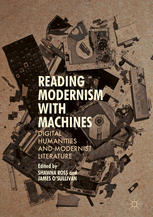

Most ebook files are in PDF format, so you can easily read them using various software such as Foxit Reader or directly on the Google Chrome browser.
Some ebook files are released by publishers in other formats such as .awz, .mobi, .epub, .fb2, etc. You may need to install specific software to read these formats on mobile/PC, such as Calibre.
Please read the tutorial at this link: https://ebookbell.com/faq
We offer FREE conversion to the popular formats you request; however, this may take some time. Therefore, right after payment, please email us, and we will try to provide the service as quickly as possible.
For some exceptional file formats or broken links (if any), please refrain from opening any disputes. Instead, email us first, and we will try to assist within a maximum of 6 hours.
EbookBell Team

4.7
56 reviewsThis book uses the discipline-specific, computational methods of the digital humanities to explore a constellation of rigorous case studies of modernist literature.
From data mining and visualization to mapping and tool building and beyond, the digital humanities offer new ways for scholars to questions of literature and culture. With the publication of a variety of volumes that define and debate the digital humanities, we now have the opportunity to focus attention on specific periods and movements in literary history. Each of the case studies in this book emphasizes literary interpretation and engages with histories of textuality and new media, rather than dwelling on technical minutiae. Reading Modernism with Machines thereby intervenes critically in ongoing debates within modernist studies, while also exploring exciting new directions for the digital humanities—ultimately reflecting on the conjunctions and disjunctions between the technological cultures of the modernist era and our own digital present.